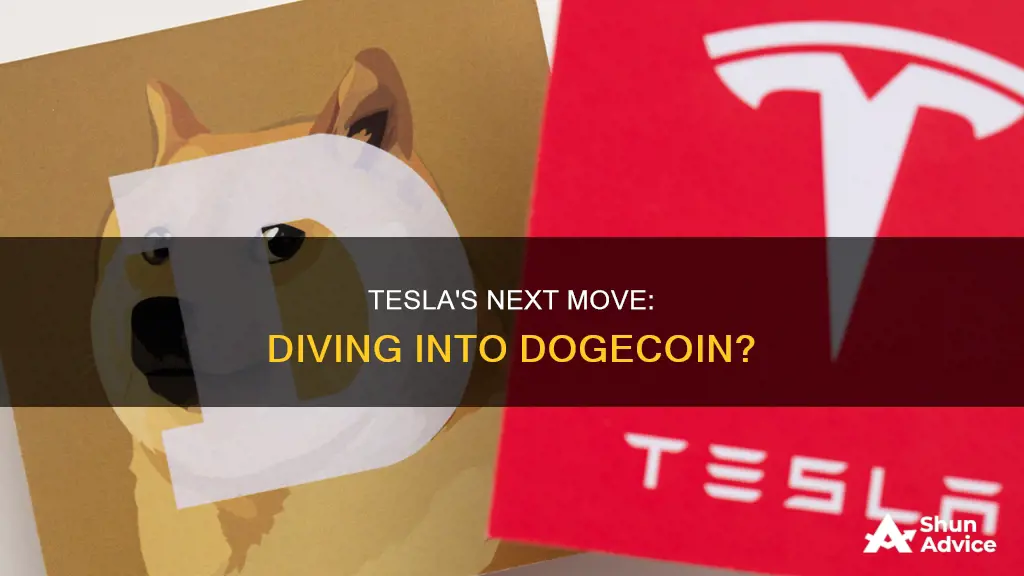
Tesla CEO Elon Musk has been a vocal supporter of Dogecoin, a cryptocurrency that started as a joke in 2013. Despite its light-hearted origins, Dogecoin has seen significant growth, with a $1000 investment at the start of 2021 being enough to buy a Tesla Model Y by April of that year. Musk's tweets have been linked to price movements in Dogecoin, but he has stated that Tesla's investments are not a reflection of his personal opinions. Instead, Tesla has chosen to invest in Bitcoin, which Musk describes as a less dumb form of liquidity than cash.
| Characteristics | Values |
|---|---|
| Tesla's investment in Dogecoin | No |
| Tesla's investment in Bitcoin | Yes |
| Reason for not investing in Dogecoin | Dogecoin is a meme cryptocurrency |
| Reason for investing in Bitcoin | Bitcoin is a less dumb form of liquidity than cash |
| Dogecoin's value in April 2021 | 45 cents |
| Dogecoin's value in June 2021 | 28 cents |
What You'll Learn

Tesla CEO Elon Musk's support for Dogecoin
Tesla CEO Elon Musk has been a vocal supporter of Dogecoin, a cryptocurrency that started in 2013 as a joke. In 2021, Musk's tweets fuelled a surge in the value of Dogecoin, causing a $1000 investment at the start of the year to be worth enough to buy a Tesla Model Y by April.
Musk's frequent tweets about Dogecoin have been associated with price movements in the cryptocurrency. In April 2021, Dogecoin spiked by more than 400% in a week, and on April 16, it hit a market capitalization of $49 billion and a record price of around 45 cents. This surge was speculated to be a result of tweets by Musk that nodded to the popular crypto-slang phrase "to the moon".
Despite Tesla's decision to invest in Bitcoin and accept it as payment for its vehicles, Musk has indicated that these investments are not "directly reflective of my opinion". He has described himself as an engineer and not an investor, and has stated that he only owns publicly-traded Tesla stock. Musk has also referred to Bitcoin as "almost as bs as fiat money", indicating his preference for other cryptocurrencies like Dogecoin.
Musk's support for Dogecoin has influenced others to invest in the cryptocurrency. For example, Glauber Contessoto, a 33-year-old man from Los Angeles, became a Dogecoin millionaire in April 2021 after investing over $250,000 in February when the price was about 4.5 cents. Contessoto cited Musk's tweets about Dogecoin as one of the reasons for his investment.
Wealth's Longevity: Unlocking the Power of Patient Capital
You may want to see also

Dogecoin's 2021 surge
Dogecoin, a cryptocurrency that started as a joke in 2013, saw a massive surge in 2021. The cryptocurrency, which was designed to serve no real purpose and had limited use, saw its value skyrocket thanks to a flurry of tweets from Tesla CEO Elon Musk. As of February 2021, Dogecoin had topped $10 billion in market value, with a single Dogecoin trading at nearly $0.33, reflecting an appreciation of 6,949.77% since the year began.
The surge in value meant that a $1,000 investment in Dogecoin at the start of 2021 would have been enough to buy a Tesla Model S electric vehicle, which sells for $72,990 in California after factoring in Clean Fuel Reward and other potential incentives.
The price surge was driven by a combination of social media hype, celebrity endorsements, and market excitement. Elon Musk's frequent tweets about Dogecoin were particularly influential, with the entrepreneur even announcing in March 2021 that Tesla would start accepting payments for its vehicles in Dogecoin.
However, Dogecoin's value is highly volatile and unpredictable. Since its all-time high in May 2021, Dogecoin has lost around 82% of its value, with holders expressing doubts about its long-term potential due to its limited usefulness.
Retirement Planning: The Optimal Investment Percentage at 45
You may want to see also

Tesla's acceptance of Bitcoin as payment
In March 2021, Tesla CEO Elon Musk announced that the company would begin accepting Bitcoin as payment for its vehicles. However, this decision was short-lived as, in May 2021, Tesla abruptly reversed course and suspended Bitcoin payments. The primary reason cited for this reversal was the concern over the amount of energy used in Bitcoin mining and transactions, particularly the use of fossil fuels, which have a significant environmental impact.
Elon Musk, a well-known promoter of Dogecoin, has also been associated with influencing the price movements of the meme-inspired cryptocurrency through his frequent tweets. Despite this, Tesla has not accepted Dogecoin as a payment method for its vehicles, except for a brief period in early 2022 when it was accepted for the purchase of certain merchandise items in the USA, such as belt buckles.
While Tesla has distanced itself from Bitcoin as a payment method, the company did invest in the cryptocurrency in February 2021, purchasing around £1.2 billion worth of Bitcoin. However, by the end of 2021, Tesla had sold off 75% of its Bitcoin holdings due to uncertainties surrounding lockdowns in Shanghai, where some of its cars are manufactured.
Despite Tesla's current stance on Bitcoin payments, Elon Musk has hinted at the possibility of the company resuming the acceptance of Bitcoin in the future. In July 2021, Musk stated that Tesla would 'most likely' restart accepting Bitcoin once they conduct due diligence on the amount of renewable energy used in Bitcoin mining. He affirmed his belief in the potential of Bitcoin, stating, "I would like to see Bitcoin succeed."
Fidelity Investments 1099-R: When Can I Expect Mine?
You may want to see also

Dogecoin's limited use for purchases
Dogecoin was created in 2013 as a joke and has since become a lighthearted alternative to traditional cryptocurrencies like Bitcoin. It is an open-source peer-to-peer digital asset inspired by the "doge" internet meme featuring a Shiba Inu dog. Dogecoin was introduced in December 2013 as an alternative to Bitcoin, with the intention to reach a broader audience.
Dogecoin operates on blockchain technology, a decentralised system that records transactions on a public ledger maintained by a network of computers known as nodes. The altcoin also has a block time of 1 minute, and there is no limit to the number of Dogecoins that can be created. This means that, unlike Bitcoin, which was designed to be scarce, Dogecoin is intentionally abundant — with 10,000 new coins mined every minute and no maximum supply.
Dogecoin's abundance means that for its price to increase or even remain steady, investors have to continually buy more coins. Otherwise, the supply of Dogecoin rises rapidly and diminishes the value of all the coins already in circulation. This is similar to inflation.
Dogecoin holders can't buy much with the cryptocurrency and can't easily convert it to cash. For most of its life, Dogecoin has been traded for no reason other than to generate online laughs. However, in 2021, Dogecoin experienced a significant price run-up as personalities like Mark Cuban, Snoop Dogg, and Elon Musk expressed their interest in it. Musk even joked that "the most entertaining outcome and the most ironic outcome would be that dogecoin becomes the currency of Earth in the future."
In March 2021, Tesla CEO Elon Musk announced that the automaker had started accepting payments for its vehicles with Bitcoin and Dogecoin. However, despite this show of support for Dogecoin, it still has limited use for purchases. While Dogecoin can be used to buy a Tesla vehicle, it cannot be easily converted to cash, and there are few other things that can be purchased with it.
Policy Levers to Spur Investment Spending: A Comprehensive Overview
You may want to see also

Dogecoin's supply cap
Dogecoin's supply is not capped, meaning there is no limit to the number of Dogecoins that can be mined. However, it does have an absolute limit of issuance per block, per day, and per year, just like other cryptocurrencies. The only difference is that Dogecoin's issuance does not have an end date. Therefore, Dogecoin is only "infinite" over "infinite time". Over a finite time, its issuance is finite.
This annual issuance is necessary to pay miners and maintain the network's security. Other cryptocurrencies, like Bitcoin, will theoretically see their yearly issuance stop completely in 2140 and will need to find alternative ways to secure their networks. Simply put, putting a cap on Dogecoin would render the network insecure and vulnerable to attacks.
Dogecoin's inflation rate is currently at a fixed amount of coins per minute, which equates to approximately 4% inflation per year and is decreasing annually. This inflation rate is better than that of the US government. Additionally, the inflation amount does not account for lost coins, which can occur through lost private keys, incorrect transactions, or the death of holders without passing on the information to loved ones. As a result, the actual inflation rate is likely closer to 3%, which is considered ideal.
Dogecoin's uncapped supply sets it apart from other cryptocurrencies and is one of the reasons why companies like Tesla have started accepting it as a form of payment. In March 2021, Tesla CEO Elon Musk announced that the company would start accepting payments for its vehicles in Bitcoin and Dogecoin. This decision, along with Musk's frequent tweets about Dogecoin, has had a significant impact on the cryptocurrency's price and popularity.
Invest Now: Best Opportunities
You may want to see also
Frequently asked questions
Tesla CEO Elon Musk said that the company's investments are not "directly reflective of my opinion". He added that Bitcoin is "adventurous enough for an S&P500 company", but that Dogecoin is not.
Musk's frequent tweets are associated with price movements in Dogecoin. Comments on Twitter by Musk have at times fuelled spikes in the price of the Shiba Inu-themed Dogecoin.
Dogecoin is a cryptocurrency that started in 2013 as a joke. It is a homage to Bitcoin and was designed to serve no real purpose. Dogecoin holders can’t buy much with it and can’t easily convert it to cash.







